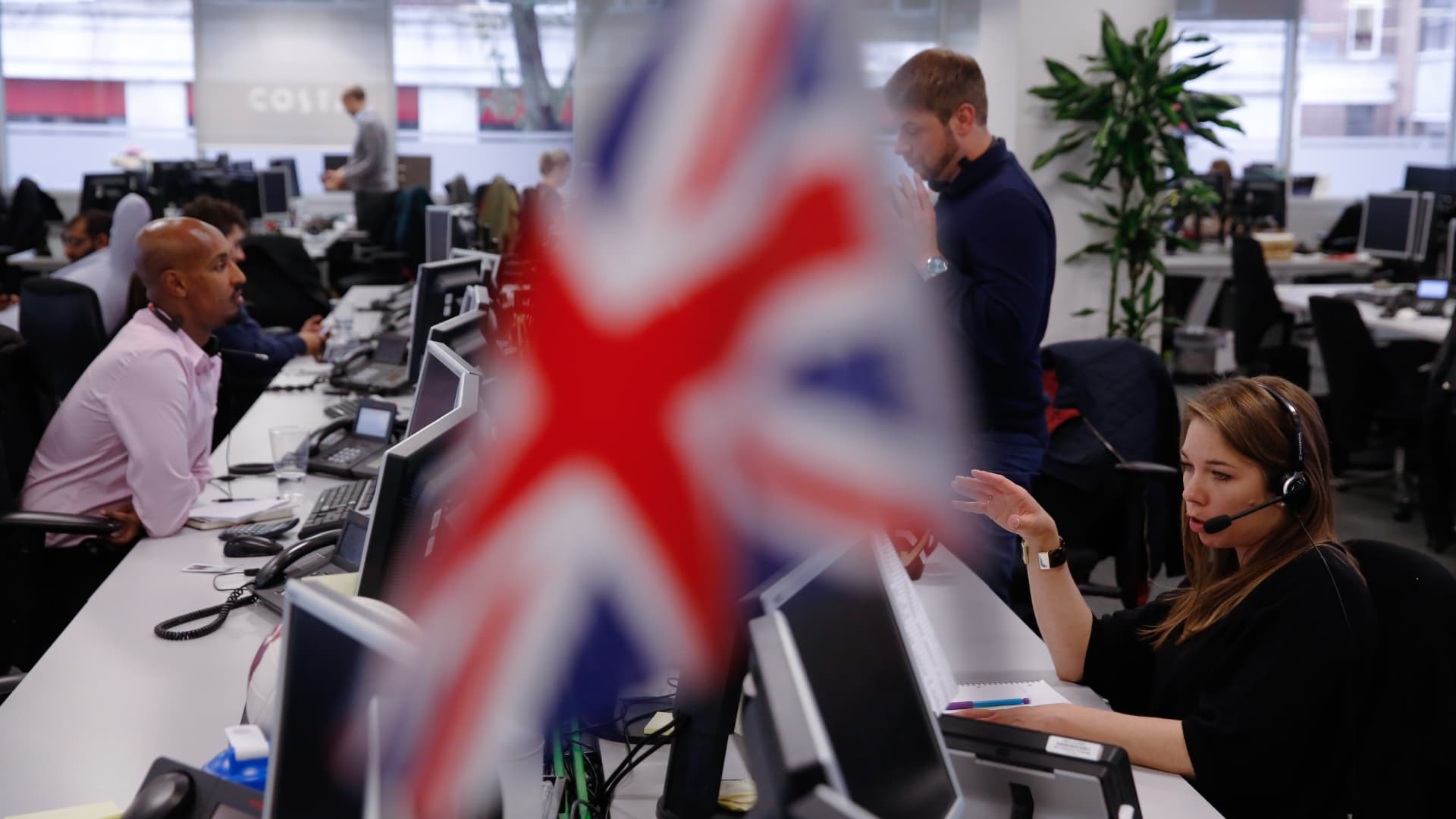
European markets made a negative start to the new trading month, having closed out August lower as traders grapple with fears of higher interest rates and a looming economic downturn.
The pan-European Stoxx 600 closed 1.8% lower Thursday, with all sectors ending the day in the red. Travel and leisure stocks led losses, falling 3.9%, followed by basic resources, down 3.8%.
Market jitters have been prevalent since Friday after hawkish remarks from Federal Reserve Chair Jerome Powell. On Tuesday, New York Fed President John Williams called for a "somewhat restrictive policy to slow demand."
U.S. stocks were lower in mid-morning trade, extending losses for the fourth day and putting the summer market comeback in doubt as investors weighed the Federal Reserve's inflation-fighting efforts.
Get Connecticut local news, weather forecasts and entertainment stories to your inbox. Sign up for NBC Connecticut newsletters.
Meanwhile, shares in Asia-Pacific traded lower Thursday as investors digested the results of a private survey on China's factory activity which showed the sector slipping into contraction this month.
Royal Mail falls 7.2%
Royal Mail fell 7.2% in afternoon trade following a second day of strikes by U.K. postal workers.
Money Report
Shares of the former state postal monopoly fell close to the bottom of the Stoxx 600 after the second day of walkouts over pay.
Royal Mail staff are planning further strikes on Sept. 8 and 9 in the latest in a slew of industrial disputes across the U.K.
— Karen Gilchrist
U.S. stocks open lower
U.S. stocks opened lower Thursday, the first day of September, as traders continued to monitor the potential for higher Federal Reserve rates.
The Dow Jones Industrial Average and the S&P 500 were both down around 0.5% in early morning trade, while the Nasdaq moved 0.8% lower.
— Karen Gilchrist
Sterling suffered its worst month since Brexit, and analysts expect it to 'plumb new depths'

Sterling in August suffered its sharpest monthly fall against the U.S. dollar since the aftermath of the Brexit referendum, as political uncertainty and a historic cost-of-living crisis weigh heavily on the British currency.
Sterling dropped 4.5% against the greenback last month and continued to slide on Thursday, last trading at $1.1566 by early afternoon in London. The pound also fell nearly 3% against the euro last month.
In a research note Wednesday, Capital Economics Chief U.K. Economist Paul Dales said this divergence would drive further weakness in both the euro and the pound against the U.S. dollar, and expects sterling to "plumb new depths" as political and economic uncertainty continue to hammer U.K. assets.
"We think the pound will fall from $1.17 now to around $1.05 by the middle of next year. That would leave it below the levels reached before the 1985 Plaza Accord ($1.09), after the UK left the ERM in 1992 ($1.43), during the 2008/09 Global Financial Crisis ($1.38), after the 2016 Brexit vote ($1.21) and during the 2020 COVID-19 crisis ($1.21)," Dales said.
- Elliot Smith
Some market players are starting to fear a major policy error from a central bank

After U.S. Federal Reserve Chairman Jerome Powell reiterated the central bank's commitment to raising interest rates aggressively to contain inflation, analysts fear that the potential impact of the Fed's quantitative tightening efforts is being overlooked by the markets.
Quantitative tightening is a monetary policy tactic used by central banks to reduce liquidity and contract their balance sheets, usually by selling government bonds or allowing them to mature and moving them off the bank's cash balances.
Analysts at London-based CrossBorder Capital have warned that the risk is growing of a "major upcoming policy error" from the Fed's course of action, specifically the "impact of excessive QT on financial stability."
The concern about QT was echoed by Mazars Chief Economist George Lagarias, who urged traders and investors to forget what they heard from Powell in Jackson Hole and instead focus on Fed assets as a single leading indicator.
- Elliot Smith
UK manufacturing activity beats estimates
U.K. factory activity offered a rare upside surprise in August, with the the S&P Global/CIPS manufacturing PMI coming in at 47.3 against a consensus forecast of 46.0.
Despite outpacing expectations, the reading still represents the worst month for British factories since May 2020, as the country battles a historic cost of living crisis.
- Elliot Smith
Euro zone factory activity contracted in August
Euro zone manufacturing activity contracted for a second consecutive month in August, according to a final S&P Global final manufacturing PMI (purchasing managers' index) reading on Thursday.
The PMI slipped to 49.6 in August from 49.8 in July, and came in below an initial flash reading of 49.7. The 50 mark separates growth from contraction.
Like many economies, the euro zone faces a cost-of-living crisis fueled by soaring food and energy bills, which are increasingly forcing consumers to curb spending.
- Elliot Smith
Stocks on the move: Glencore down 5%, Reckitt down 4%
Anglo-Swiss mining and commodity trading giant Glencore saw its shares fall more than 5% in early trade to the bottom of the Stoxx 600.
Reckitt Benckiser shares fell 4% after the Anglo-Dutch consumer goods company announced that CEO Laxman Narasimhan will step down at the end of the month after a three year tenure at the helm.
There was little to report by way of positive share price movement in early deals.
- Elliot Smith
CNBC Pro: Goldman Sachs says mutual funds have been on a tear this year. Here's what they're buying
"A greater share of mutual funds has outperformed their benchmarks in 2022 than in any year since 2009," according to Goldman Sachs.
What's driving the outperformance? And what are these funds buying?
Pro subscribers can read more here.
— Zavier Ong
U.S. 2-year Treasury yield rises to 14-year high
U.S. Treasury yields rose further to 3.52% in Asia's morning trade, the highest since November 2007.
The yield on the short-term 2-year Treasury note reached similar levels on Tuesday, when it hit 3.497%.
The yield on the benchmark 10-year Treasury note also rose to 3.22%, while the yield on the 30-year Treasury bond was at 3.3%.
Yields move inversely to prices, and a basis point is equal to 0.01%.
—Jihye Lee
Caixin PMI shows China's factory activity shrank in August
The results of a private survey showed China's factory activity contracted in August.
The Caixin/Markit manufacturing Purchasing Managers' Index came in at 49.5 for August, compared to 50.4 in July.
PMI readings are sequential and represent month-on-month expansion or contraction. The 50-point mark that separates growth from contraction.
China's official manufacturing PMI for August slightly beat expectations at 49.4.
— Abigail Ng
European markets: Here are the opening calls
European stocks are expected to open cautiously higher on Wednesday with the U.K.'s FTSE index seen 18 points higher at 7,560, Germany's DAX 33 points higher at 13,944, France's CAC 40 up 18 points at 6,616 and Italy's FTSE MIB up 42 points at 23,029, according to data from IG.
Data releases include preliminary euro zone unemployment data for the second quarter as well as second quarter gross domestic product. The latest U.K. inflation numbers for July will be released as well as preliminary second quarter Dutch GDP.
Earnings come from Uniper, Carlsberg, Persimmon, Balfour Beatty, BAT and National Grid.






